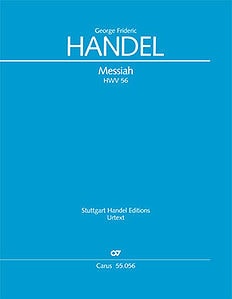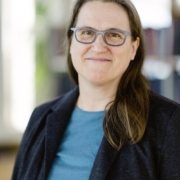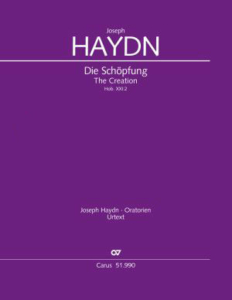It All Started with Handel…
English Music Festivals and the Oratorio
Rich choral sounds, impressive oratorios and a close connection between music and charity have characterized the tradition of English music festivals since the 18th century. Dr. Barbara Mohn highlights the development of this unique festival culture.
Georg Frideric Handel is the creator of the English oratorio. When he first staged his Esther as a religious drama without scenic action at the King’s Theatre in London in 1732, it marked the beginning of an unparalleled success story. Opera audiences were so enthusiastic about the new genre that from that time onwards Handel, who was not only a composer but also a theater manager, filled his opera houses with oratorios based on biblical themes. In 1741 he composed the Messiah – this time not for the opera stage, but for a benefit concert in Dublin. The work was to play a special role in Great Britain, becoming a symbol of the connection between music and charity. Handel himself performed the oratorio every year in aid of a London orphanage. Such performances of the Messiah and later of other oratorios too for charitable purposes were one of the central driving forces behind the development of the great music festivals that were held from the early eighteenth century onwards, initially in Britain and somewhat later also in Germany and other countries.
The Messiah – a symbol of successful charity
From 1698 onwards London’s cathedral choirs gathered once a year in St. Paul’s Cathedral for the Festival of the Sons of the Clergy, the proceeds of which went to a relief fund for the widows and orphans of clergymen. This idea was adopted in many places, including the three neighboring cities of Gloucester, Worcester, and Hereford, where the “Three Choirs Festival” still exists today in a modified form. In the late eighteenth century, some of the fast-growing industrial towns and cities in northern and central England also began to organize music festivals lasting several days. The impetus for these festivals came from wealthy, philanthropic entrepreneurs, not from the churches. However here, too, the concept of music festivals was born out of a desire to raise money for a charitable cause, usually the city hospital. Until the end of the nineteenth century, the performance of the Messiah was a central attraction of music festivals and could be relied on to bring in the largest profits.
Some striking figures:
Messiah, London, 1883 – 4,000 choir singers, around 440 instrumentalists, an audience of 22,388
Interior View of Westminster Abbey
on the Commemoration of Handel
ca. 1790
The music festival tradition was also fueled by the British reverence for Handel. The Handel commemorations held in Westminster Abbey – the first one was in 1784 – were so legendary that Joseph Haydn attended them in 1791 and was subsequently inspired to compose his own oratorio The Creation (1797/98). Later the Handel festivals took place at London’s Crystal Palace. In 1883, 4,000 choir singers and around 440 instrumentalists performed the Messiah there. The audience was also suitably large: apparently 22,388 people were in attendance.
English music festivals developed into veritable oratorio festivals, at which more and more oratorios would be performed. When Antonín Dvořák’s Requiem was premiered at the Birmingham Music Festival in 1891, the Festival program also included performances of the Messiah, Felix Mendelssohn Bartholdy’s Elijah and Johann Sebastian Bach’s St. Matthew Passion, as well as two other world premieres: Veni creator spiritus, a cantata by Alexander Mackenzie, and Charles Villiers Stanford’s great oratorio Eden. All these works were performed by just one single choir over four days – a superb achievement!
In the nineteenth century the Birmingham Music Festival was highly renowned both nationally and internationally. The oratorio performances featured top-class musicians and guest conductors such Hans Richter, with famous opera singers such as Jeanne-Anaïs Castellan, Pauline Viardot, Jenny Lind, Thérèse Tietjens, and Emma Albani. The large, top-class choir was composed exclusively of professionals until the 1850s and grew in number from 134 singers in 1820 to 371 in 1888.
A truly impressive tradition of world and English premieres
As with other major music festivals, the audience was to be treated to world or English premieres. To this end, the organizers nurtured close contacts with well-known composers at home and abroad, and they also commissioned compositions. Birmingham undoubtedly scored its greatest coup when it commissioned Felix Mendelssohn Bartholdy to compose a piece for the 1846 festival and then celebrated the acclaimed premiere of Elijah under the baton of the composer himself. The work was sung in an English translation that Mendelssohn himself had carefully edited. Mendelssohn praised the choir, even if he was amazed by the “bearded altos”: in keeping with old cathedral traditions, male voices still sang the alto parts in the festival choir until 1900, and there were also boys among the soprano singers until 1881.
Town Hall, Birmingham,
During The Festival (Engraving)
Topographical Views – Wilkinson Collection
Elijah
Felix Mendelssohn Bartholdy
MWV A 25 (op. 70), 1845-1846
Critical edition by R. Larry Todd
Carus 40.130/00
The list of sacred oratorios composed as commissions for British music festivals is lengthy. It includes works by Sigismund Neukomm (David, Birmingham 1833), Louis Spohr (The Fall of Babylon, Norwich 1842), Niels Gade (Zion, Birmingham 1876), Charles Gounod (La Rédemption, Leeds 1882, and Mors et Vita, Birmingham 1885), Dvořák (St. Ludmila, Leeds 1886, and Requiem, Birmingham 1891), Camille Saint-Saëns (The Promised Land, Gloucester 1913) and many others. From the mid-nineteenth century onwards, it was considered good form to commission home-grown composers. William Sterndale Bennett, Arthur Sullivan, Charles Villiers Stanford, and Hubert Parry all composed oratorios for music festivals, although Edward Elgar’s commissions for Birmingham – The Dream of Gerontius (1900), The Apostles (1903), and The Kingdom (1906) – were the first to become firmly established in the concert repertoire.
Great honor – and organizational stumbling blocks
As significant and honorable as such a music festival commission was, the process from commissioning to performance was often far from smooth. When Dvořák received the commission for the 1891 music festival and subsequently composed his Requiem, the fee negotiations dragged on for so long that the commission almost fell through. Edward Elgar, on the other hand, simply could not find a libretto when he received a commission from the Birmingham Music Festival in 1900. In January of that year a representative of the music festival visited Elgar in person, and only then was an agreement reached on the Dream of Gerontius by the late Birmingham Cardinal John Henry Newman. There was so little time left for the composition, the preparation of the sheet music and rehearsals that the choir and soloists sang a semitone too low in parts of the premiere. Mendelssohn Bartholdy was also left with very little time between receiving the commission for his Elijah in January 1846 and the premiere in October. After the premiere he took the decision to revise the work thoroughly.
Louis Spohr
Daguerreotype
Other music festivals had similar problems. The Norwich Music Festival, for example, had close ties to Louis Spohr, who was commissioned to compose a new oratorio in 1842. Earlier performances of his works, especially Des Heilands letzte Stunden (Calvary. The Last Hours of the Savior), had required major changes due to the English-language version, and thus, even though he spoke hardly any English, Spohr was offered an English text from the start, called The Fall of Babylon. In the end his employer, the state ruler in Kassel, forbade Spohr from traveling to the music festival. Gounod, on the other hand, did not dare to travel to England for the premiere of his Mors et Vita in 1885 because he was involved in a court case there relating to a former girlfriend. Three years earlier the dispute had meant that he could only conduct the premiere of La Rédemption in 1882 under police protection.
Famed throughout the country and featuring international performers, the music festivals of the nineteenth century provided a magnificent platform for oratorios and other choral symphonic works. At the same time they served to promote both local charitable causes and contemporary choral music in a striking fashion.
Since 1994 Dr. Barbara Mohn has been an editor with Carus-Verlag; from 2000 to 2008 she headed the editorial office of the Complete Edition of the works of Josef Rheinberger.









 The primary source on which the Carus Urtext edition is based is the first edition of the score from 1800. Contrary to normal custom, Haydn published the score himself in order to avoid unauthorized publications and to present an optimally designed edition from an “authentic hand.”
The primary source on which the Carus Urtext edition is based is the first edition of the score from 1800. Contrary to normal custom, Haydn published the score himself in order to avoid unauthorized publications and to present an optimally designed edition from an “authentic hand.” – Practical performing Urtext edition based on the latest state of Bach research
– Practical performing Urtext edition based on the latest state of Bach research “This is the best of me”, wrote Edward Elgar after the final measure of his Dream of Gerontius. Premiered in 1900, in Great Britain the work has long been a standard work in the repertoire of large oratorio choirs. Elgar’s moving, poetic setting of the eponymous poem by Cardinal John Henry Newman is about a dying man and his journey beyond death to God.
“This is the best of me”, wrote Edward Elgar after the final measure of his Dream of Gerontius. Premiered in 1900, in Great Britain the work has long been a standard work in the repertoire of large oratorio choirs. Elgar’s moving, poetic setting of the eponymous poem by Cardinal John Henry Newman is about a dying man and his journey beyond death to God. Louis Spohr’s Des Heilands letzte Stunden (Calvary) from 1835 is one of the most important Passion oratorios of the 19th century. The text written by the well-known theologian Friedrich Rochlitz inspired Spohr to compose a magnificent setting of the Passion, from the interrogation of Jesus to the burial.
Louis Spohr’s Des Heilands letzte Stunden (Calvary) from 1835 is one of the most important Passion oratorios of the 19th century. The text written by the well-known theologian Friedrich Rochlitz inspired Spohr to compose a magnificent setting of the Passion, from the interrogation of Jesus to the burial.

Leave a Reply
Want to join the discussion?Feel free to contribute!